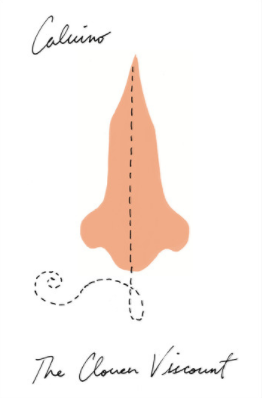The Nonexistent Knight and the Cloven Viscount by Italo Calvino (Book Review)
The Nonexistent Knight

One of reason why Calvino novels are such a delight to read is because of the way in which a simple setting and story is transformed through a fantastical reimagining. The Nonexistent Knight tells the story of Agilulf, a knight in Charlemagne’s army, who embodies the ideals of chivalry: honor, bravery, and piety. His full title is actually Agilulf Emo Bertrandin of the Guildivern and of the Others of Corbentraz and Sura, Knight of Selimpia Citeriore and Fez. However, and as the title of the novel suggests, Agilulf does not actually exist. That is not to say he does not speak, or ride a fine horse, or where resplendent white armor, but there is no visible form beneath the armor, nor is it the case of an actual man wearing a cloak of invisibility. Agilulf never existed before and does not exist now. Upon discovering that a knight in his army bears such remarkable properties, Charlemagne entreaties the knight:
“Well, well! Who’d have thought it!” exclaimed Charlemagne. “And how do you do your job, then, if you don’t exist?”
“By will power,” said Agilulf, “and faith in our holy cause!”
While the exact details are omitted, we are told that Charlemagne’s forces are there to fight the infidels, which one assumes are the Moorish armies that sparred with Christian forces in Spain and France. Early on we are also introduced to Raimbaut of Roussillon, a knight who has come to avenge his father who was killed by the Moor Argalif Isohar. Raimbaut initially displays a youthful and naive excitement to engage with the enemy but is dispirited when he finds out that the official order of battle is bureaucratic and his father’s death is not remembered by anyone in the army. As usual, Calvino manages to make a delightful and fantastical mockery of medieval battles. Knights line and up and charge at each other, but make sure that no one is directly in the either’s path to avoid actual combat. When actual battle does occur:
Here rank and intensity of insult was decisive, for according to whether offense given was mortal–to be wiped out in blood–medium or light, various reparations were laid down or even implacable hatreds transmitted to descendants. So the important thing then was to understand each other, not an easy thing between Moors and Christians and with the various Moorish and Christian languages; what did one do if along came an insult one just couldn’t understand? One might find oneself swallowing it and being dishonored for life. So interpreters took part in this phase of the battle, light-armed men swiftly mounted on fast horses which swiveled around catching insults on the wing and translating them there and then into the language of destination.
After nearly accidentally slaying Argalif Abdul, Raimbaut eventually finds Argalif Isohar, but is interrupted by his spectacle bearer. Somewhat unchivalrously, Raimbaut smashes the spectacles and slays the true Argalif. Why feeling proud of his accomplishment, Raimbaut never feels totally satisfied with the execution of his revenge. A lesson that these implacable hatreds may be less than cathartic in practice.
The relationship between Agilulf and Raimbaut is always at cross purposes in the story. Raimbaut does not understand the loneliness of not-existing, and Agilulf does not understand Raimbaut’s mortal passions. After the first battle, Raimbaut falls in love with the female warrior Bradamante after she saves him. Unfortunately for him, Bradamente is in love with Agilulf, who is either unaware or disinterest in requiting her love.[1] How can a woman love a nonexistent knight?[2]
How? Well, if a girl has had enough of every man who exists, her only remaining desire could be for a man who doesn’t exist at all.
Agilulf’s loneliness at not existing is compounded by his inability to win friends with the other knights. Because Agilulf must follow all rules of propriety he cannot allow small white lies or anything with a whiff of dishonor to stand without comment. He reminds Roland that he did not actually win Excalibur from a duel but rather the sword was surrendered in accordance with the terms of an armistice. He suggests that the dragon skin acquired by Rinaldo was not due to him slaying the dragon but rather acquired through the natural sloughing of their skin. Naturally, he is hated by everyone. Despite his unpopularity, Agilulf never fails to make full use of his rights at the dinner table.
But he who ate nothing needed more attendance by servers than the whole of the rest of the table. First of all–while there was such a confusion of dirt plates everywhere that there was no chance of changing them between courses and each ate as best he could, even off the tablecloth–Agilulf went of asking to have put in front of him fresh crockery and cutlery, plates big and small, porringers, glasses of every size and shape, innumerable forks and spoons and knives that had to be well sharpened. So exigent was he about cleanliness that a shadow on a glass or plate was enough for him to send it back. He served himself a little of everything. Not a single dish did he let pass. For example, he peeled off a slice of roast boar, put meat on one plate, sauce on another, smaller, plate, then with a very sharp knife chopped the meat into tiny cubes, which one by one he passed on to yet another plate, where he flavored them with sauce until whey were soaked in it. Those with sauce he then put in a new dish and every now and again called a lackey to take away the last plate and bring him a new one. Thus he busied himself for half hours a time. Not to mention chickens, pheasants, thrushes–at these he worked for whole hours without ever touching them except with the points of little knives, which he asked for specially and which he very often had changed in order to strip the last little bone of its finest and most recalcitrant shred of flesh. He also had wine served, and continuously poured and repoured it among the many beakers and glasses in front of him; and the goblets in which he mingled one wine with the other he every now and again handed to a lackey to take away and change for a new one. He used a great deal of bread, constantly crushing it into tiny round pellets, all of the same size, which he arranged on the tablecloth in neat rows. The crust he pared down into crumbs, and with them made little pyramids. Eventually he would get tired of them and order the lackeys to brush down the table. Then he started all over again.
Despite his seemingly flawless record, the knight Torrismund of Cornwall challenges Agilulf’s claim that he saved Sophronia, the virgin daughter of the King of Scotland. This is a serious change since:
The code of chivalry then holding prescribed that whoever saved from certain danger the virginity of a damsel of noble lineage was immediately dubbed knight. But saving from rape a noblewoman no longer a virgin only brought a mention in the dispatches and three month’s double pay.
If the accusation was true, then the Agilulf’s career and standing could be dissolved:
If Sophronia’s virginity which he had saved was proved nonexistent, then his knighthood went up in smoke too, and nothing that he had done afterwards could be recognized as valid at all, and his names and titles would be annulled, so that each of his attributions would become as nonexistent as his person.
The absurdity of the purity-based element of our morality is amusingly exposed by Calvino. Agilulf begins a quest to determine if he can establish the “honour” of Sophronia those fifteen years ago when he saved her from bandits. While Agilulf’s deed is eventually verified to be true, due to a comedy of errors, he believes himself to be mistaken and loses his will power to go on existing in a nonexistent form.
While there are many ways to interpret The Nonexistent Knight, I believe Calvino wants us to realize that even if the impossible qualities of chivalry could ever be obtained, they would still be undesirable. Ultimately, a truly ethical person must be pragmatic enough to see through their own mistakes, and those around them, lest they become brittle, and fall apart at the first and inevitable display of conduct which violates their own impossibly strict moral code. The idea that even the better angels of our nature may be problematic is to be found in the other Calvino story discussed below.
The Cloven Viscount

The second novella, The Cloven Viscount is one of Calvino’s gothic masterpieces. Taking place in the 17th century when the Ottoman Empire was battling Christian armies in Central Europe, the Viscount Medardo leaves his ancestral home of Terralba to help wage war on behalf of Christendom. His inexperience on the battlefield causes him to foolishly charge a cannon which discharges a cannonball at short range that splits his body in half from left to right. Luckily, battlefield medicine was able to stitch one side of Medardo back together.
When the sheet was pulled away, there lay the Viscount’s body, horribly mutilated. It not only lacked an arm and a leg, but the whole thorax and abdomen between that arm and leg had been swept away by the direct hit. All that remained of the head was one eye, one ear, one cheek, half a nose, half a mouth, half a chin and a half of a forehead; the other half of the head was just not there. The long and short of it was that just half of him had been saved, the right part, which was perfectly preserved, without a scratch on it, except for that huge slash separating it from the left-hand part blown away.
Upon returning the Terralba the townspeople of family of Medardo are excited to hear of his survival, although are at first horrified by his mutilated appearance. Saddened by his reception, Medardo storms into the castle and locks himself in his room. The first evidence we are given that this returned Medardo has a sinister character is when his father trains a shrike (a type of bird) to visit him in his room where he has cloistered himself.
A little later he [the father] heard the thud of something flung against the windows. He leant out; there on the pediment was the shrike, dead. The old man took it up in the palms of his hands and saw that a wing was broken off as if someone had tried to tear it, a claw wrenched off as if by two fingers, and an eye gouged out. The old man held the shrike to his breast and began to sob.
Medardo’s reign of terror would continue from this point with random executions, poisonings, and arson terrifying the local population. Wandering one day through his estate, Medardo spots the simple peasant girl Pamela and falls in love with her. Aware of her lordship’s psychopathic tendencies, Pemala is smart enough to rebuff his advances despite the encouragement from her parents to do the opposite. We are shown a glimpse of Medardo’s psychology when he addresses his younger cousin one day:
“If I could have every thing like this,” said my uncle, lying face down on the rocks, stroking the convulsive half of an octopus, “so that everyone could escape from his obtuse and ignorant wholeness. I was whole and all things were natural and confused to me, stupid as the air; I thought I was seeing all and it was only the outside rind. If you ever become a half of your-self, and I hope you do for your own sake, my boy, you’ll understand things beyond the common intelligence of brains that are whole. You’ll have lost half of yourself and of the world, but the remaining half will be a thousand times deeper and more precious.”
As time goes by the townspeople of Terralba begin to notice a mysterious force which seems to be offsetting the wickedness of the Viscount. Fires are being put out, bird wings and being mended, and the sick are being treated. Some report that these deeds are being carried out by Medardo himself. However, we soon discover that this force is none other than the other half of Medardo that was found by monks under a pile of corpses. The two Medardos are now referred to as the Good ‘Un and the Bad ‘Un.
While overwhelmingly Catholic, Terralba also sports a small number of Huguenots that fled France to escape persecution. The Huguenots have been the most successful group at preventing the bad Viscount’s half from torching their property. As is Calvino’s wont, we get a comical and fantastical version of the Huguenots:
While crossing the mountains they had lost heir books and sacred objects, and now had neither Bibles to read from nor Mass to say nor hymns to sing nor prayers to recite … Inexpert in what constituted sin, they multiplied their prohibitions lest they make mistakes, and were reduced to giving each other constant severe glances in case the least gesture betrayed a blameworthy intention. With confused memories of theological disputations, they avoided naming God or using any other religious expression, for fear of sacrilege. So they followed no rites and probably did not even dare formulate thoughts on matters of faith, though preserving an air of grave absorption as if these were constantly in their minds.
When the Huguenots meet the Good ‘Un, they quickly lose their enthusiasm since his moral perfection leads him to criticize their business practices such as having agricultural prices that are too high while there are starving peasants. As with the nonexistent knight, we find both sides of the Viscount to be problematic. In the end, a showdown between the halves of the Viscount over marriage to Pamela leads to their physical recombination. The Cloven Viscount is a delightful read, combining Calvino’s command of fantastical language with humor and parody. At the root of Calvino’s philosophy is a deeply humanist perspective that is empathetic to the human experience and rational to the empirical realities of our world.
Thus the days went by at Terrabla, and our sensibilities became numbed, since we felt ourselves lost between an evil and a virtue equally inhuman.
Footnotes
-
In Orlando furioso by Ariosto Bradamante actually falls in love with a Saracen warrior. ↩
-
It should also be noted that the narrator of the story is a nun. ↩
